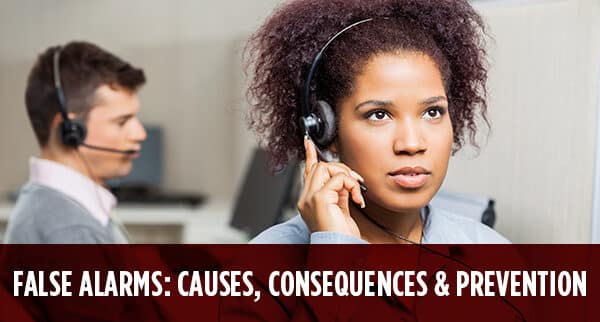Commercial false alarms cost Arizona police and fire departments millions of dollars per year. Whether the alarm is for intrusion, burglary or fire, nearly 95% of those triggered are false. To offset these costs, local agencies have created false alarm penalty fee schedules. For example, in Scottsdale, Arizona, fines start at $50 and can go up to $200 with each occurrence, and at some point, the city may cancel your permit.
Depending on what part of Arizona, if the alarm is triggered and no one can verify why, it’ll be classified and handled as a false alarm. Each emergency department has different protocols on how to handle those situations. Some will dispatch officers just as in any other call, others won’t respond at all, and the rest will delay the response to a lower triage level.
When no emergency is present, triggering an alarm intentionally can violate the law in some areas, with possible fines and even imprisonment time.
Causes of False Alarms
Human error is a significant factor when it comes to triggering false alarms. These are usually simple sources, such as:
- Access points, like doors or windows, are not secured properly, are completely open, unlocked, loose-fitting or otherwise faulty.
- Unfamiliarity with arming/disarming/triggering. Keep reading to learn how you can overcome these kinds of problems.
After human error, other common causes of false alarms are:
- Sensitivity of devices. Some security devices, such as detectors and sensors, are more sensitive than others. Any disturbances, such as wind or rain, could trigger them. There are a few motion detectors that can activate when security dogs are alone in off-hours and roaming the premises. Glass-break detectors can be triggered if doors are slammed, or if a dog barking or construction work is nearby.
- A leading cause of false alarms in commercial spaces is sensor placement. If a sensor is too close to an HVAC unit, an air vent or receives blowing air from a fan, it can trigger an alarm.
How to Prevent False Alarms
To prevent false alarms at your business, training your employees or anyone that enters security system codes is an excellent way to start to prevent false alarms at your organization. Other occupants that may receive this training may include:
- Real estate professionals or property managers
- Vendors or contractors
- Cleaning or other after-hours staff
- Any additional occupants that may need to arm or disarm the system
Have them practice entering the code to be more familiar with the system and understand how it works.
Keep a clean space. Dust around the devices such as sensors, detectors and cameras. Check for anything loose or seemingly out of place while you’re in that area. Contact APL if you discover anything out of the ordinary during your routine cleaning and inspection time.
Request regular alarm testing. Keep your security equipment in proper working order with routine service requests from APL. Batteries in sensors or detectors that are weak or defective can cause an alarm trigger even when the system is disarmed.
Don’t be the alarm that cried wolf!
APL Access & Security
By completely understanding the unique challenges, performance expectations and available technologies, APL Access & Security can provide effective and customizable security solutions in Phoenix AZ. APL Access & Security creates comprehensive and customized solutions to meet the most complex demands. Serving the Southern Arizona region for over 35 years from convenient locations in Gilbert and Tucson. Providing all security integration services including shooter detection, managed services, electrified door hardware and more!


Leave a Reply
You must be logged in to post a comment.